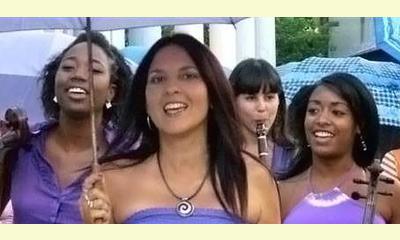|
|
Rochy Ameneiro promotes a culture of peace (Cuba)
an article by Ricardo Alonso Venereo, Diario Granma (abridged)
If a Cuban artist has been seen to defend a
culture of peace, it has been the pop singer,
Rochy Ameneiro. In this effort the artist has not
only joined colleagues but has nurtured an entire
team, in which there are prestigious specialists
who support and raise their voices against all
manifestations of violence against women.

click on photo to enlarge
They initiated the project "Everyone in the
Counterforce: No to violence in music," that,
following an initial presentation at the Casa del
Alba Cultural - more than two years ago, has toured
the country with excellent results.
"Music has become in recent times a transmitter of
violent values with a powerful influence in
society," the artist told this writer, voicing
her concern. "Many texts of songs present
negative values that incite to violence against
women. "Many present women as sex symbols, along
with a marked tendency to homophobia, among other
archaic values. I am convinced that we, as
musicians, can reverse this situation. . . "
According Rochy, it is necessary to promote
efforts and spaces where women performers fight on
stage against gender violence, using music as an
effective means to combat this scourge. In this
way we can join forces in the task of building a
society based on respect, equality and a culture
of peace.
"I consider myself fortunate," she told me, "that
Everyone in the Counterforce: No to violence in
music receives support from the Cuban Institute of
Music, the Federation of Cuban Women and the
Ministry of Education, through its Department of
Art Education. I have also had the support of Dr.
Julio César González Pagés , coordinator of the
Network Ibero-American and African Network of
Masculinities ( RIAM ) in our country with his
team, and Dr. Isabel Moya, director of the review
Women and Chair of the Department of Gender and
Communication of the José Martí International
Institute of Journalism. Also, the AHS and UNEAC
and of course, the Ministry of Culture and its
institutions.
"The experience , after two tours of the country ,
the first in 2012 and second in this year, has
been enriching . Among the actions we take are
lectures and workshops. The latter, called "Music
and Culture: video clips and other cultural events
in the triad of violence," is one of the most
appreciated. It includes a theoretical part
illustrated by the projection of music video clips
. . .
(Click here for a Spanish version of this article)
|








|
DISCUSSION
Question(s) related to this article:
What place does music have in the peace movement?,
* * * * *
Latest reader comment:
As of now, there are 33 CPNN articles on this theme, which shows the great extent to which music is the universal language of peace!

|
|









